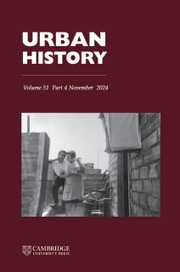No CrossRef data available.
Article contents
The construction and form of modern cities: exploring identities and community
Published online by Cambridge University Press: 14 February 2003
Abstract
‘Urban historians’, we are told, are ‘obliged to be more eclectic’ than other scholars of the city. The volumes covered by this review certainly speak to the rich diversity of urban history making.* While the others can take a ‘well-defined disciplinary perspective’ – as sociologists, geographers, etc. – only we are expected to ‘study the interaction of the urban fabric on the social fabric’ in its ‘unique spatial setting’ across social, economic and political boundaries (and of course through time). This is a rhetoric – an ideal, perhaps – with which most of us, doubtless, are already familiar. But how does it translate into practice? In our everyday imperfect world of time constraints a nominal commitment to eclecticism can instead spawn specialization, and thus a lack of cross-disciplinary ‘cohesion’, so that the ‘umbrella’ of diversity instead becomes an agency for introversion. To be truly eclectic, therefore, presumably urban historians need to be not only better read (and/or brighter) than other academic colleagues, but also better resourced! Yet before we all rush to our respective departmental heads to make a claim, we need to ask, too, whether this declaration of eclecticism is little more than yet another ‘idealized’ story that we tell about ourselves: part of our identity, of how we would like to be seen, an affirmation of our self-view. Is it as ‘imagined’, for example, as other forms of identity – a construct to serve a purpose? Is it there to make us feel special, valued and privileged?
- Type
- Review Article
- Information
- Copyright
- © 2002 Cambridge University Press




